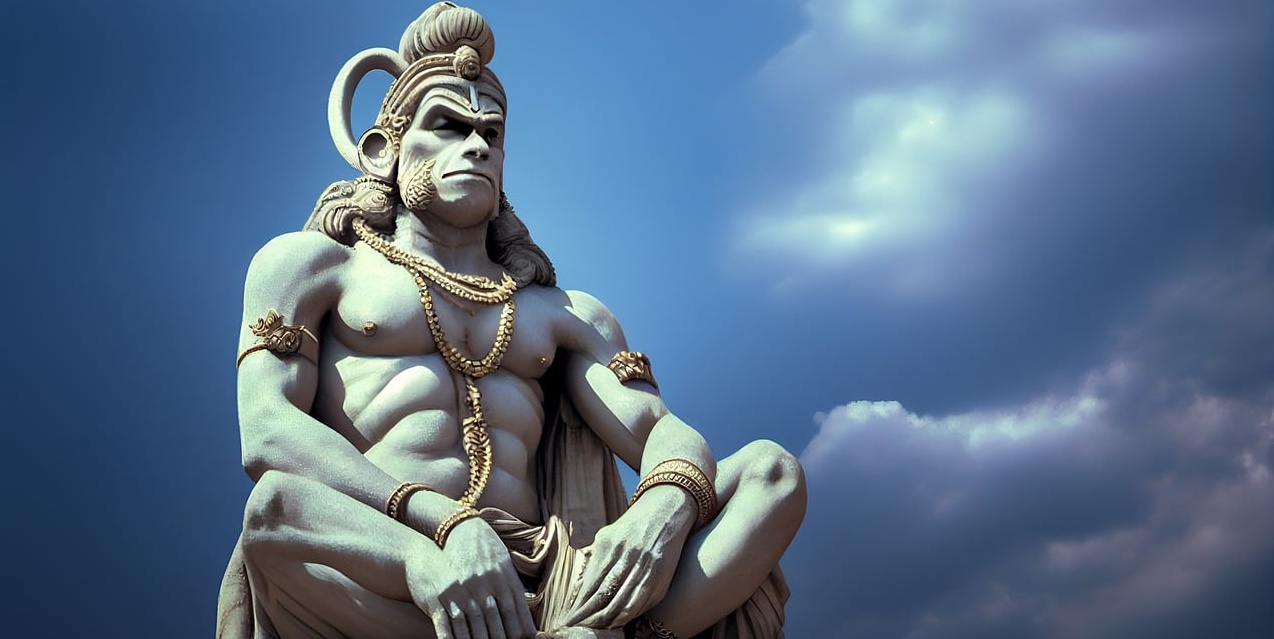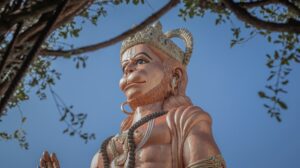Can Bajrang Baan be read daily?
The mighty Bajrang Baan, a sacred text dedicated to Lord Hanuman, resonates with crores of devotees seeking his blessings. But a question often arises – can the Bajrang Baan be incorporated into our daily spiritual practice, or is it reserved for dire situations? Let’s delve into the rich history of this powerful text, explore the significance of its bija mantras, and discover the wisdom of the Shastras to answer this intriguing question.
Story behind Bajrang Baan
यस्य स्मरणमात्रेण जन्मबन्धविमोक्षणम्।
हनुमान् लंकाविध्वंसकृत् वन्दे तं बलशालिनम्॥
I bow to the mighty Hanuman, whose mere remembrance grants liberation from the cycle of birth and death. He, the destroyer of Lanka.
हनुमत्कृपया लभते विद्यां धनं बलम्।
जयं कीर्तिं च राज्यं च हनुमत्प्रीतिलब्धये॥
By the grace of Hanuman, one obtains knowledge, wealth, and strength. Victory, fame, and even a kingdom can be achieved through Hanuman's favor.
हनुमत्प्रसादात् बलं देहि देव।
शत्रुसंहारं कुरु मे विधेहि॥
O Lord Hanuman, by your grace, grant me strength. Destroy my enemies, make it happen for me.
The exact origin of the Bajrang Baan remains shrouded in some mystery. While some traditions attribute its authorship to the revered Goswami Tulsidas, concrete historical evidence is elusive. Nonetheless, its profound content and timeless devotion to Lord Hanuman leave no doubt about its ancient and revered status.
The very name, “Bajrang Baan,” translates to “arrow of Bajrang Bali,” another name for Hanuman. This powerful scripture is structured as a collection of verses, each extolling Lord Hanuman’s divine qualities, unwavering strength, and unwavering devotion to Lord Rama.
Potency of Beeja Mantras in Bajrang Baan
मन्त्राणामपि बीजानि देवानां चैव रूपाणि।
तस्मात् बीजानि जप्यन्ते सर्वसिद्धिप्रदाणि।।
Bija mantras are the seeds of mantras, and they are also the forms of the Devas (deities). Therefore, bija mantras are chanted to grant all kinds of accomplishments.
बीजं नाम परं मन्त्रं गुह्या गुह्या च तत्कला।
तन्मया भावना देवी बीज रूपा जगन्मयी।।
Bija mantra is the supreme mantra, a secret among secrets, and its technique (kala) is also a secret. The goddess, who is the embodiment of the bija, pervades the entire universe.
बीजं मन्त्रस्य शिरः प्रोक्तं देवता तस्य मध्यगम्।
फलं तु तस्य तत्त्वज्ञं मन्त्रस्य परमात्मनः।।
The bija is said to be the head of the mantra, the deity is its middle, and the fruit (benefit) is for the one who knows the essence of the mantra, the supreme Self.
The Bajrang Baan is infused with potent bija mantras, sacred syllables believed to hold immense power. These mantras act as doorways, invoking the energies of specific deities. Here are some prominent examples found within the text:
Om Hrim (Hrim repeated 3 times): This powerful mantra invokes the combined blessings of Lord Hanuman and Durga Maa, seeking their protection and strength.
Om Hum (Hum repeated 3 times): This bija mantra awakens the immense inner strength and power residing within Lord Hanuman.
Aim (ऐं): Often associated with the goddess Saraswati, this mantra represents wisdom and knowledge, qualities that Lord Hanuman embodies.
Kreem (Krim): This bija mantra, sometimes linked to the goddess Kali, signifies transformation and the destruction of negativity.
Hring (ह्रीं): This versatile mantra can invoke various deities, including Lakshmi (abundance) and Durga (protection), reflecting the multifaceted blessings one can seek through the Bajrang Baan.
Importance of Initiation for Beeja Mantras
The potency of bija mantras demands respect and proper guidance. The Shastras emphasize the importance of initiation (diksha) from a qualified Guru (spiritual teacher) before chanting these powerful syllables. A Guru can provide the necessary understanding, pronunciation techniques, and spiritual context to unlock the full potential of these mantras.
Understanding Ram Duhai in Bajrang Baan
उठु, उठु, चलु, तोहि राम दुहाई। पायं परौं, कर जोरि मनाई॥
ॐ चं चं चं चं चपल चलन्ता।ॐ हनु हनु हनु हनु हनुमन्ता॥
इन्हें मारु, तोहि सपथ राम की, राखु नाथ मरजाद नाम की॥
The Bajrang Baan contains a powerful verse, “Uthu, Uthu, Chalu, Tohin Ram Duhai” (Rise, Rise, Set Forth, I Call Upon Rama). This verse signifies Hanumanji’s unwavering devotion to Lord Rama. The Bajrang Baan uses potent mantras and references Lord Rama’s name as a form of command. This compels Hanuman to intervene, rather than simply requesting his help. Therefore, some devotees reserve the Bajrang Baan for critical situations where they need Hanuman’s immediate and forceful intervention. Some interpretations suggest that invoking this verse signifies a desperate plea for help, implying the Bajrang Baan should be reserved only for dire situations.
Chant Bajrang Baan Daily? Proceed with Caution
The Bajrang Baan, though revered for its power, is by some considered a last resort in the face of mortal danger. Unlike other prayers, the Bajrang Baan employs potent verses that invoke Lord Rama’s name and bind Hanuman in a powerful oath. This is seen as a form of command, urging Hanuman’s immediate and forceful intervention. Therefore, some devotees believe it’s best reserved for dire situations, where there’s a question of life and death. In these moments, the Bajrang Baan becomes a call to Hanuman’s immense strength, a final plea for his protection when all other options are exhausted.
While the Bajrang Baan offers immense spiritual power, there are reasons to approach daily recitation with caution, particularly for those who haven’t received proper initiation:
Respecting the Power of Beeja Mantras: As discussed, bija mantras are potent and require proper guidance for safe and effective use. Daily recitation without initiation might not unlock their full potential and could even have unintended consequences.
Focus on Intent: The “Ram Duhai” verse signifies a desperate plea. Daily recitation, ideally, should be a practice filled with devotion and gratitude, not solely focused on seeking immediate intervention.
Alternative Practices: Many other powerful Hanuman prayers and practices exist, like the Hanuman Chalisa. These might be more suitable for daily devotion, allowing you to cultivate a deeper connection with Lord Hanuman.
The Final Decision: A Responsible Choice
Ultimately, the decision of how often to recite the Bajrang Baan rests with you. If you choose daily recitation, ensure you do so with respect and a commitment to understanding its deeper meaning. However, consider exploring alternative practices or seeking initiation from a qualified Guru to unlock the full potential of this powerful scripture.
Remember, a genuine connection with Lord Hanuman can be cultivated through various paths. Choose the one that resonates most deeply with your spiritual journey.
Om Shri Hanumate Namah!









Shri Hanuman Aarti